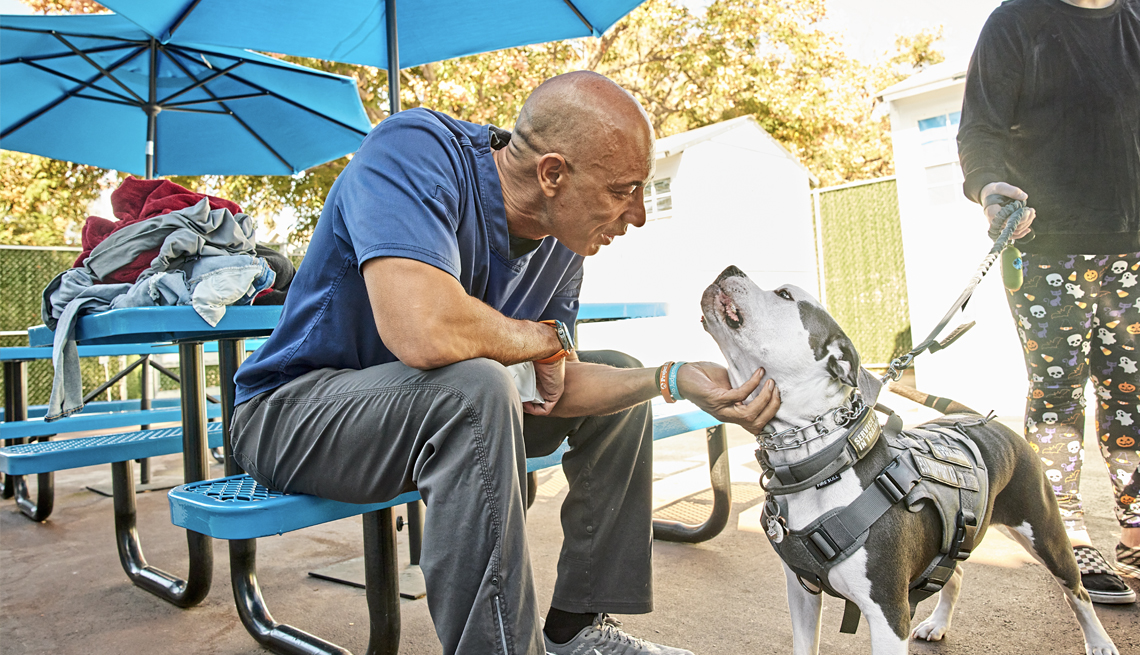Staying Fit
Kwane Stewart provides free care to the animals of people who are homeless. Stewart, 51, is the chief medical officer of Papaya Pet Care in San Diego and cofounder of the nonprofit Project Street Vet. The organization gives care, treatment and support to the pets of people experiencing homelessness or financial hardship. Stewart’s work, he says, has taught him a lot about life.


AARP Membership— $12 for your first year when you sign up for Automatic Renewal
Get instant access to members-only products and hundreds of discounts, a free second membership, and a subscription to AARP the Magazine.
Kwane Stewart: During the Great Recession, I moved to a city in California’s Central Valley and became a shelter vet. Hordes of animals were coming in, and we couldn’t keep them all, but as a municipal shelter, we couldn’t turn them away, either. I got a taste of what it’s like, sadly, to euthanize dozens of animals every day. It broke my heart. I began to feel like I was losing in the eyes of God. I was starting to feel guilty; I started developing anxiety. I was looking for something to pull myself out of that emotional situation.
Then everything changed in a moment. It was about 10 years ago. On my way to work, I would always stop for gas and coffee at the same spot. I kept noticing a homeless man who was hanging out there. His dog was suffering from a skin condition. I’m like most people — I walked right past the man without talking to him. But I couldn’t stop noticing that poor dog. After maybe a couple of weeks, I stopped and asked the man about the dog. When I got closer to her, she looked almost as if she had been burned. She had scabs and redness and infection. It looked like it could have been something serious, but I knew it was just a flea issue. So I said, “I’m going to be back with medicine,” and dropped some off to him the next day. A couple weeks later, I ran into him again. The dog was transformed. Her hair was coming back, and she was wagging her tail. He started to cry and said, “Thank you for helping—for not ignoring.”
I started getting a little teary-eyed, too. When you’re overlooked and dismissed by everybody and the thing you love most is suffering but no one will help you, it’s so hard. I decided to find people who can’t get help for their pets — and give it to them. I dedicated a portion of my salary for medicines and procedures. When I had to refer a case, I could usually talk colleagues into reducing their fee.
Eventually, I left the shelter and joined a practice, and I also set up a nonprofit to provide care for the pets of homeless people. The biggest thing I’ve learned over the years is to approach everyone without judgment, with a perfectly clean slate. These people are just people. They’re no different from anyone else. For whatever reason, they have found themselves in a bad place. They may have had a difficult family past. They may have had some kind of addiction. They may have made some poor choices — who hasn’t? — but may not have had the kind of support they needed to come out of it. So to be able to help them help that animal they love so much, it’s something practical I can do that will take one worry off their mind. Kindness can’t solve every problem, but it can solve a lot of them.
Leslie Quander Wooldridge is a contributing writer who covers personal finance, wellness and relationships. Her work has appeared in publications including The Washington Post and Men's Health, and she previously served as senior editor of Sisters From AARP.
More Remarkable Careers
- Retired exec finds new life as a school bus driver
- Roving art teacher brings creativity to isolated students
- Grandmother uses teaching experience to fill virtual school void
































































